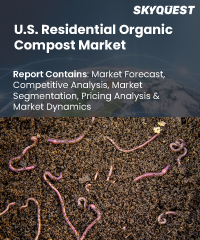
Report ID: SQMIC25AE2004

Report ID:
SQMIC25AE2004 |
Region:
Country |
Published Date: April, 2024
Pages:
223
|
Tables:
64 |
Figures:
77
US Residential Organic Compost Market Drivers
Growing demand for organic food
Rising awareness about the benefits of composting
Increasing adoption of sustainable practices
US Residential Organic Compost Market Restraints
Limited consumer awareness
High cost
Limited supply
Lack of standardization
Our industry expert will work with you to provide you with customized data in a short amount of time.
REQUEST FREE CUSTOMIZATIONWant to customize this report? This report can be personalized according to your needs. Our analysts and industry experts will work directly with you to understand your requirements and provide you with customized data in a short amount of time. We offer $1000 worth of FREE customization at the time of purchase.

Report ID: SQMIC25AE2004